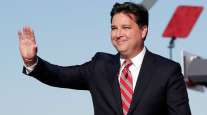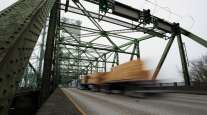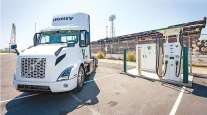Trump’s Change of Heart Puts $1 Trillion Building Plan in Limbo

Donald Trump’s infrastructure guru spent part of Sept. 26 at a conference in Washington promoting the president’s $1 trillion plan to rebuild the nation’s crumbling roads, bridges and airports relying in part on public-private partnerships. The same day, across town, Trump was telling lawmakers that those kinds of deals don’t work.
The president’s apparent change of heart on what’s been an important pillar of his economic plan left key constituents of the infrastructure initiative reeling.
Trump’s remarks, relayed by three lawmakers after a closed meeting with Republicans and Democrats on the House Ways and Means Committee, raised new questions about how the plan would be financed, and whether the president was instead considering increasing federal funding for building projects — a prospect made harder by the large tax cut the administration proposed Wednesday.
Democratic lawmakers welcomed the potential opening for more federal spending, while deficit hawks bristled. Both sides, though, are still struggling to interpret Trump’s apparent turnaround.
“It’s hard to say whether he’s doing this to try to open some doors for more bipartisan discussion, or whether it’s really a fundamental policy change,’’ said Robert Poole, director of transportation policy at the Reason Foundation, a free-market research group.
“If it’s fundamental policy change, I imagine there’ll be some people looking for new jobs in the White House because you hired them to do P3 infrastructure,” he said, referring to public-private partnerships.
Legitimate Questions
Following Trump’s comments to the lawmakers, the White House said there are legitimate questions about how public-private partnerships can be incorporated into the infrastructure plan, but that all viable options are still being considered.
Before this week private investment had been at the core of Trump’s ambitious infrastructure plan. It was a feature of his campaign material and promoted in the early months of the administration.
Trump built his infrastructure team around DJ Gribbin, an expert on public-private partnerships who’s worked on such deals for Macquarie Capital USA Inc. and Koch Industries. Trump also enlisted other private sector leaders to advise on the subject.
Gribbin, special assistant to the president for infrastructure policy, spoke at the P3 Hub Americas conference at the Mayflower Hotel on Sept. 26 — the same day that Trump, back at the White House, seemed to reverse course. Gribbin urged supporters of P3s to overcome the opposition to such deals, according to the P3 Bulletin, an infrastructure news publication, which hosted the event.
‘Knee-Jerk Reaction’
“There has been a knee jerk reaction to P3s from a liberal perspective in a negative way, and a knee jerk reaction from conservatives that think P3s are free money,” Gribbin said, according to a P3 Bulletin report. “Both of those are wrong, and it would be really helpful for this community to get out there and educate about the reality of P3s.”
In an initial framework released in May, the administration said it would commit at least $200 billion of federal funds over 10 years to generate $800 billion in spending by states, localities and the private sector. Trump’s latest remarks raised questions about whether that plan will change or be delayed. The administration had said it would deliver a proposal to Congress by the end of September, before saying the plan would come after the tax overhaul.
Gary Cohn, Trump’s top economic adviser, told reporters in August that an infrastructure bill could start in the House as soon as a tax measure moves from the House to the Senate.
Business groups and companies hoping for a boost in spending are getting impatient.
‘Partisan Divides’
“Unfortunately, competing agendas and partisan divides continue to distance us from a national infrastructure package, which should be at the top of the nation’s agenda,’’ Michael Burke, chairman and chief executive of AECOM, the world’s biggest engineering firm, said in a statement.
White House spokeswoman Natalie Strom said the administration is making progress. It’s already taken steps to streamline infrastructure permitting and “continues to work every day on solutions, whether they are as small as shifts in practice within agency offices, or as large as the upcoming legislative package,” she said in an email.
“All of these solutions will contribute to the trillion dollar infrastructure investment the president has promised the American people,” Strom said.
Infrastructure Stocks
After Trump’s election, the promise of a major initiative initially buoyed stocks of construction and materials firms such as AECOM, Chicago Bridge & Iron Co., Fluor Corp., Jacobs Engineering Group Inc., Martin Marietta Materials Inc., Vulcan Materials Co. and U.S. Steel Corp. The potential opportunity for more investment opportunities also helped unlisted infrastructure funds secure $20 billion this year in North America alone as of August, according to data provider Preqin.
But the infrastructure stocks fell off after Trump took office, relative to the overall Standard & Poor’s Index of 500 companies, and the economy could suffer if Trump sides with Democrats to shift the burden of infrastructure spending to the federal coffers using deficit spending, particularly in light of the tax cuts proposed Wednesday, said Patrick Newton, a spokesman for the Committee for a Responsible Federal Budget.
“Both lower tax rates and expanded infrastructure can help grow the economy, but if we borrow to finance either we’ll probably end up dragging the economy down instead,” Newton said.
Republican lawmakers and some business groups downplayed Trump’s comments, saying the private sector would still play a major role in any initiative. Senator Jim Inhofe of Oklahoma, chairman of the Subcommittee on Transportation and Infrastructure, said Trump’s remarks showed that there are certain places -- like rural areas -- where public-private partnerships don’t work and the government needs to step up.
No Golden Egg
“I think he’s doing it to make sure that people know that that isn’t the golden egg, that isn’t going to solve the problem,’’ Inhofe said in a telephone interview.
The U.S. Chamber of Commerce, which made infrastructure a 2017 policy priority, remains confident that the private sector will be part of the solution, said Ed Mortimer, executive director of transportation infrastructure.
“We can argue about how much part of the solution, but you don’t address a $2.5 trillion deficit in infrastructure with just traditional funding sources,” Mortimer said.
Representative John Delaney of Maryland and other Democratic lawmakers have advocated linking a tax bill with infrastructure, including using a proposed tax on overseas profits to pay for public works.
The White House has said the two efforts are separate for now, and not all Democrats are on board anyway. Representative Peter DeFazio of Oregon, the top Democrat on the House Transportation and Infrastructure Committee, rejected combining the two issues if it would be in exchange for tax cuts for the wealthy.
‘Hell No’
“The answer would be, ‘Hell no,”’ DeFazio said.
Ed Rendell, a former Democratic governor of Pennsylvania and Democratic National Committee chairman and a co-founder of Building America’s Future, a bipartisan coalition that promotes infrastructure, said his party needs to work with Trump.
“You weren’t elected to serve the interest of the Democratic Party,’’ Rendell said in a telephone interview. “You were elected to serve the interests of the United States of America and folks, infrastructure revitalization cannot be put on hold until 2021.’’
Meanwhile, the Senate Environment and Public Works Committee is moving forward on its own. Senator John Barrasso of Wyoming, the panel’s chairman, said the committee is preparing its own bill and is working to make it a priority this year. The 10 Democrats on the committee signed a letter in July that called for more than $500 billion in funding, including $100 billion to reconstruct and repair deteriorating roads and bridges on the federal highway system.
“They’ve had plenty of time and God bless them, they don’t seem to have rallied around a package that they’re ready to show us yet,’’ said Senator Tom Carper of Delaware, the committee’s top Democrat. “We ought to go ahead and start talking amongst ourselves and see what we can agree to.’’
Kevin DeGood, director of infrastructure policy at the left-leaning Center for American Progress, said he thinks Congress will need to draft the actual bill and that Trump’s comments raise questions about the entire process: “I literally think we’re back to square one.




